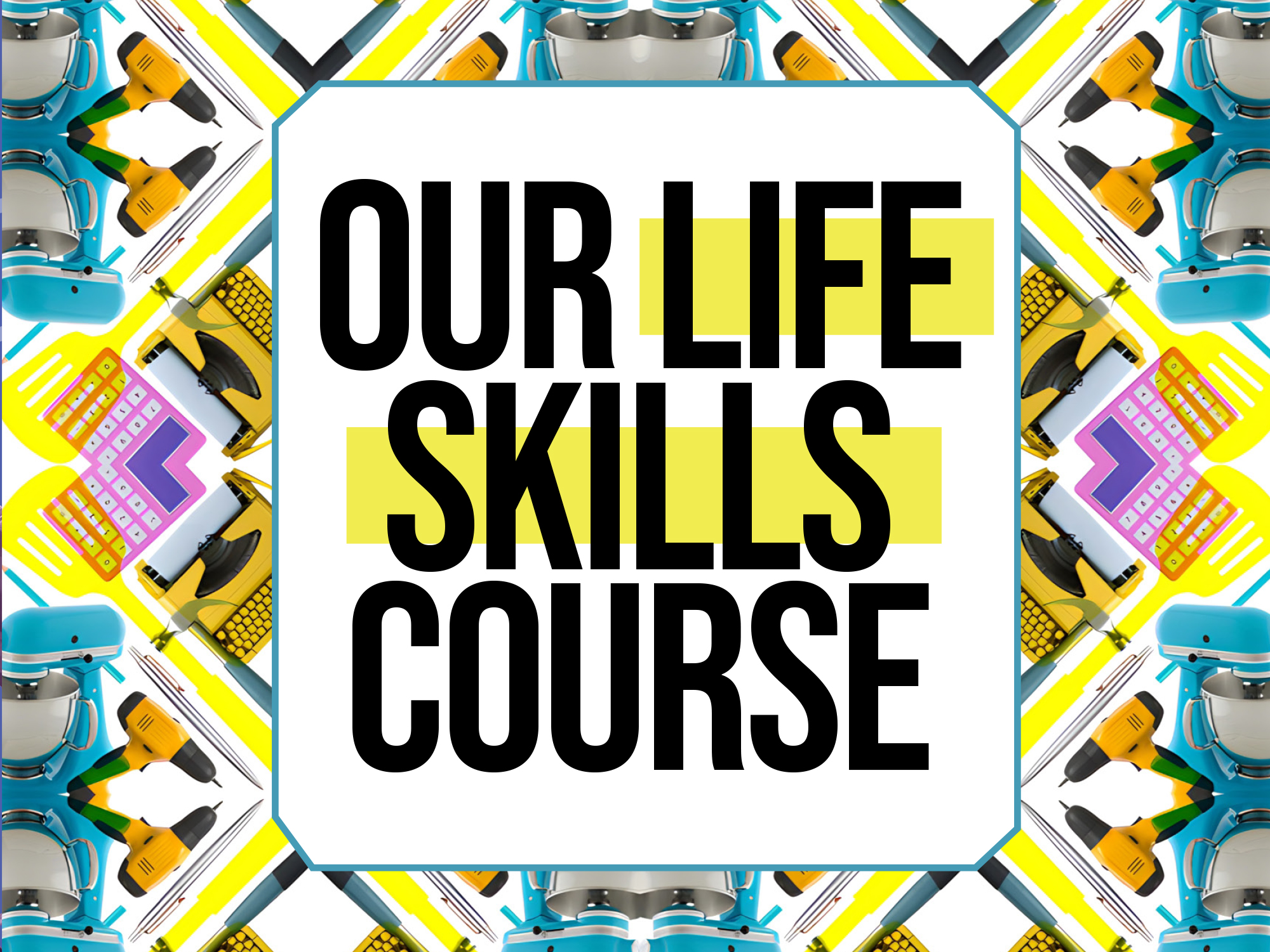Writing by Susan Trumpbour
Artwork by Elizabeth Gourlay
School teaches our children many things: The Pythagorean Theorem, where to properly place a comma, how to dissect a frog, etc. – education is crucial. Our teachers do an incredible job, are underpaid/under-supported and, if we’re being honest, deserve sainthood.
But schools do have their limits; they cannot teach our children everything our kids need to know to make their way in the real world. Some lessons, such as how to do laundry, should be taught at home. And there are others (how to get over heartbreak, the art of losing well, understanding it’s okay to make mistakes) our children should discover autonomously.
However, just as college admissions require prerequisites, we think a life skills course should be a requirement before embarking upon, well, life (after high school). So, we chatted with several teens and recent college graduates to understand what “they wished they had learned in school,” and then developed our very own Katonah Connect Life Skills Course.
It’s full of helpful advice and life-honing activities for you to teach your kids – each skill is broken down into four lessons. The best part is, there’s very little you must buy (although we do recommend having a bottle of Tylenol and/or a glass of wine ready for yourself at the end of each lesson).
And maybe, just maybe, your kids will thank you when you’re done. Or, you know, maybe they won’t – but at least you’ll have the Tylenol and/or wine to console yourself.

Personal finance
Financial stability is a goal for all individuals, and young adults are no exception. Money management can be tricky to navigate, so giving teens the necessary information to confidently tackle a few core areas is essential.
1. Loans (student, car, home, etc.).
Understanding how to get a loan, when you should/ shouldn’t get a loan (a.k.a good vs. bad debt), the importance of paying off loans and how they affect your credit are all important lessons that, if not learned early, can impact their life for years to come.
2. Budgets.
Having a budget will make sure they don’t spend more than they earn (or receive as a weekly allowance). Once they can manage a budget, shake up their strategies by introducing a few “surprises,” like short- and long-term expenses.
3. Taxes.
The concept of taxation can be overwhelming. Teach them about net vs. gross pay stubs, income brackets, and how to prepare their tax return (or hire a good accountant). And don’t forget to remind them to pay their taxes on time, or else Uncle Sam might come knocking on their door.
4. Retirement (and long-term financial well-being).
The basics of retirement programs are a great place to start. Use simple language to explain how starting early can provide them with more financial security and freedom in the future.

Food basics
While we fully support the lessons on MyPlate (today’s version of the food pyramid) taught in health class, understanding how to meal plan, shop on a budget and cook are essential. We highly recommend the “teach a man (or teen) to fish” approach to help your child become an independent adult.
1. Making a meal plan and grocery list.
Getting the most bang for their buck requires putting together a list in advance and taking them to the store to show them how to stick to it.
2. Shopping strategically.
Point out the benefits of taking advantage of sales and comparing prices. Make sure to spend time discussing rewards programs and how to calculate unit prices as well so they can understand how to stretch a dollar.
3. Cooking simple and healthy meals.
Flavorful and easy meals require little time and a short list of ingredients. Focus on foods you know they like and teach them how to add herbs and spices to enhance the flavor.
4. Embracing leftovers.
Not all leftovers are bad. Teach them how to turn leftover food into a delicious stir fry, casserole or frittata, and how to ensure they won’t spoil in the fridge.

Shop class
Learning basic DIY skills can teach teens how to analyze problems and find practical solutions, and it may even spark an interest in a trade or vocational career (see page 56). Additionally, teens will be able to fix things without immediately calling mom or dad for help – now, wouldn’t that be nice!
1. Learning basic tools.
Start with the basics. Teach your teen how to hammer a nail, hang a picture and how/why to find the stud. Show them how to use a saw, screwdriver, wrench and other essential tools.
2. Minor home repairs.
Move on to minor home repairs like fixing a leaky pipe, stopping a running toilet or patching up a wall. This will encourage them to take care of minor household problems on their own, making them less dependent on others, and hopefully preventing an emergency plumber visit after midnight.
3. Power tools.
They’ve mastered the basics, so now it’s time to learn how to use tools that require electricity. From a simple electric screwdriver to a drill or circular saw, go as far as your teen will let you.
4. First aid.
Hammers, nails, power tools – someone’s bound to need a bandage at some point. Teach basic first aid, like how to respond to injuries and what is an actual medical emergency, are potential lifesaving lessons. And as a bonus, equipping them with this knowledge could prevent a half day spent in urgent care when a minor wound only needs a simple bandage.

Law school 101
This law class is designed to level up their legal game and give them the skills and knowledge necessary to become active, responsible citizens who will know how to read a contract and when to call a lawyer.
1. Contracts.
Teach them the ins and outs of contracts, from legal obligations to cautionary steps they should take before signing any agreements. This way, they won’t get caught in a legal loophole.
2. Voting.
Civics lessons must now be taught at home. Share the importance of how they can make a difference. Don’t forget to cover voting eligibility criteria, how to actually vote (tip: take them with you from a young age, and this lesson will be covered) and other essential information, like citizen status and voter deadlines.
3. Getting pulled over.
Help your teen keep their cool when getting pulled over by teaching them about their rights, what they must provide and what they should (and shouldn’t) say in such situations. Note: This lesson may need to be repeated, depending on your teen’s attitude.
4. Miranda Rights.
It’s best to educate them about their Miranda Rights when they’re calm and can fully understand what they imply. This way, they can make knowledgeable choices if they’re ever approached by law enforcement. And yes, permission granted to turn to Hollywood for scenarios.

Effective communication
Learning practical verbal communication skills, like active listening and setting boundaries, can help teens build healthier personal and business relationships, as well as advocate for themselves.
1. Active listening.
In this age of digital distractions when social media and technology compete for face-to-face conversation, teach them how to actually look at, and listen, to someone.
2. Empathy.
Looking at a situation through someone else’s eyes helps build strong bonds and ease conflicts. Read short stories together to build empathy with people who are different than themselves so they can master this skill.
3. Honesty.
Teach them how to voice their thoughts and feelings respectfully, instead of repressing emotions and increasing stress and anxiety.
4. Setting boundaries.
Please teach them it’s okay to say no when they are uncomfortable or if something violates their principles. And, if we’re being honest, knowing how and when to say no politely yet confidently is an essential skill that we ALL need to learn.

Job prep
Looking for a “real job” can be complex, stressful, time-consuming and, yet, rewarding. But it involves numerous aspects, from writing a resume and interviewing to what to wear and the importance of a firm handshake.
1. Writing a resume.
We grant permission to outsource this step and jump to Step 2.
2. Networking.
Teach them the importance of first impressions by sharing this statistic: it only takes seven seconds to form one. Then, show them how to introduce themselves, seek job advice, secure potential job opportunities and remain in contact with who they’ve met.
3. Interviewing.
Yes, it’s important to teach your children what to wear, how to respond to questions, what to ask, and how to give a firm handshake (no wet fish, please).
4. Workplace etiquette.
They’ve landed the job…now they have to keep it. Everything from showing up on time to how to speak/respond to their boss is worth teaching – none of this is taught in school.
You’ve got this
As we conclude our Katonah Connect Life Skills Course, we’d like to leave you with this:
When you provide your teen with practical guidance they can use in the real world, you’re teaching them independence and building their self-esteem. Remember, nothing boosts a teen’s morale more than accomplishing something on their own.
Editor’s note: We encourage you to keep this article as a guide for what to teach your teens. And if you lose it, you can find it on our website.
This article was published in the September/October 2023 print edition of Katonah Connect.

Susan Trumpbour
Susan Trumpbour, a.k.a. ‘Dear Beauty Editor’, has spent over 20 years as a beauty editor, new product development executive and trend consultant. If she isn’t writing about beauty, she’s creating shades and formulas for top cosmetics houses like L’Oréal, Maybelline and Neutrogena. In her spare time, she enjoys hiking the beautiful trails in Bedford, where she lives with her husband, two sons and their white fluffy rescue dog.










